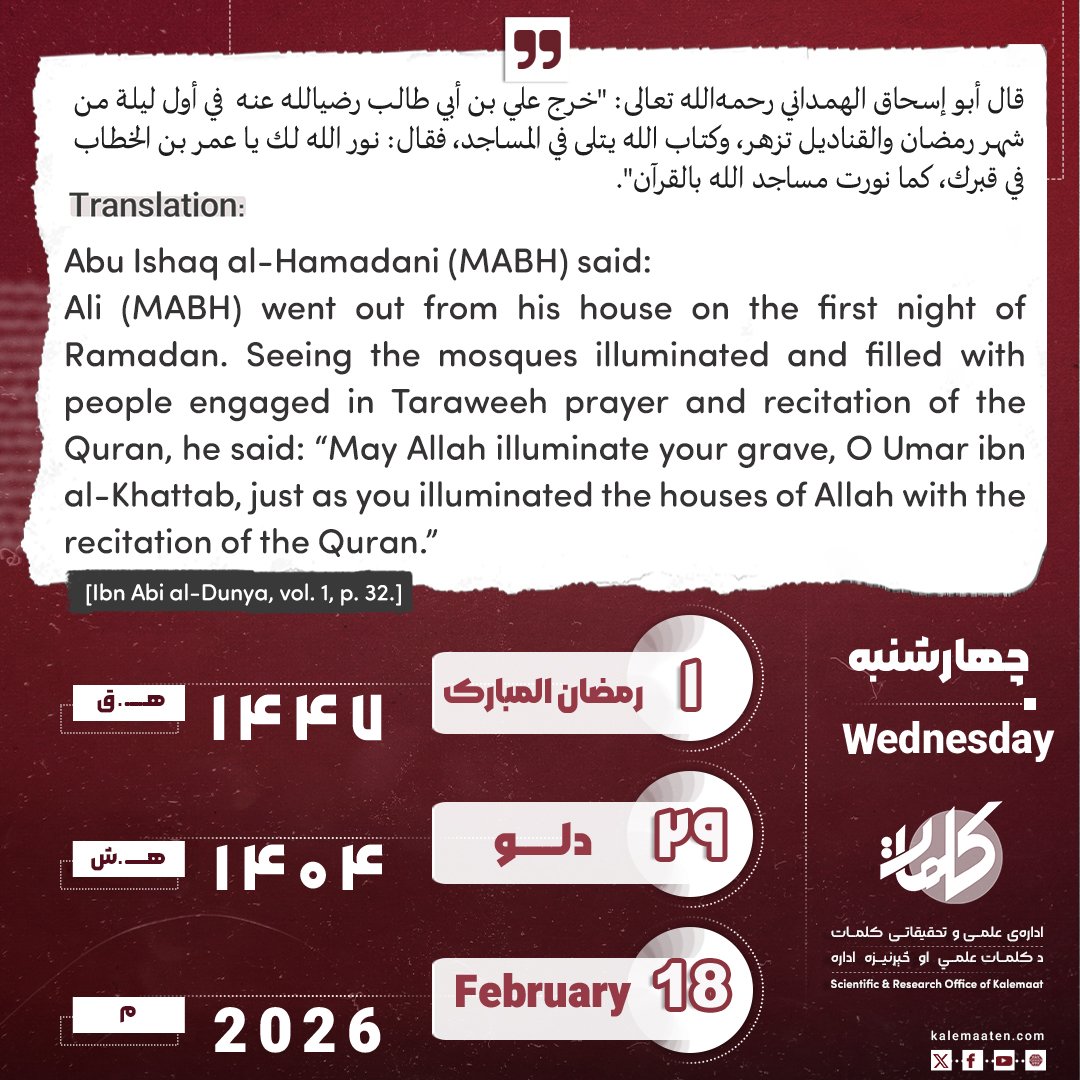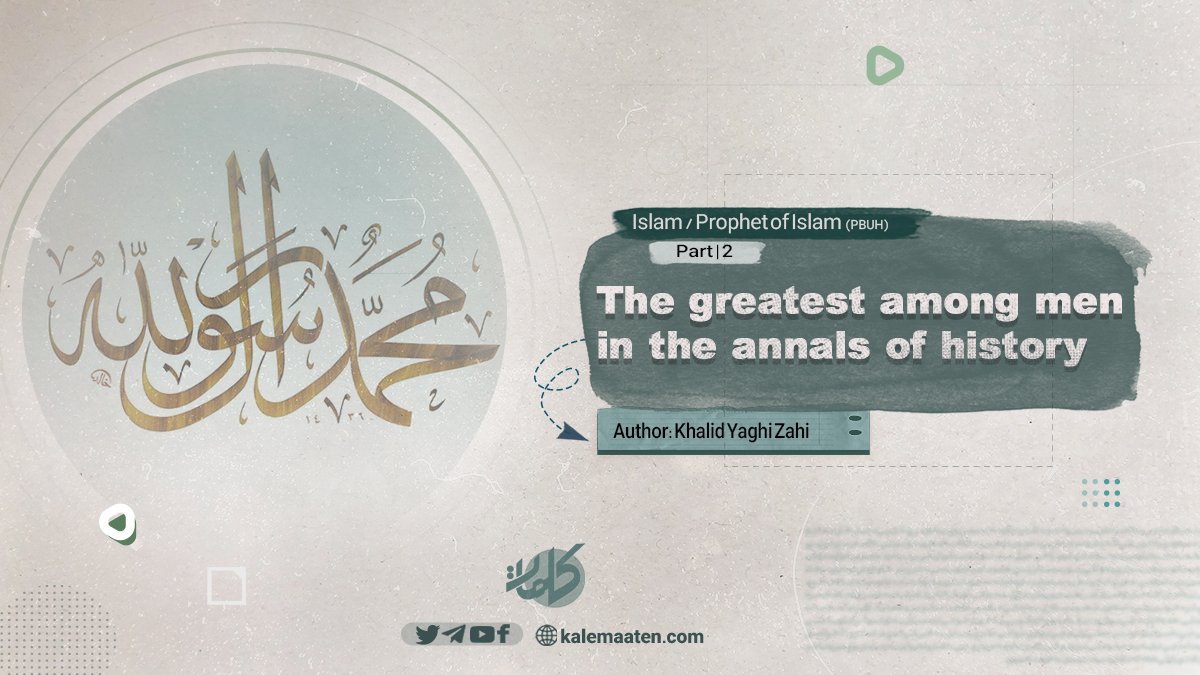Author: Khalid Yaghi Zahi
The Greatest Among Men in the Annal of History (Part Two)
1. From the Images of Hijrah
The leaders of the Quraysh reached an agreement to commit the greatest crime in the history of humanity—one that, if executed, would have meant no mention of Damascus, Baghdad, Cairo, or Cordoba in history. There would have been no Rashidun Caliphate, no Umayyads, no Abbasids; the Ottomans would not have conquered Constantinople, the Umayyad Mosque would not have been built, nor would the Nizamiyah and Alhambra. A civilization that Europe later appropriated from the Levant during the Crusades and from Andalusia afterward would have been nonexistent. The course of history would have changed undeniably, and today we would find ourselves in a situation known only to Allah.
In this context, the manhood of Muhammad (PBUH), along with his courage and confidence, shines through, and the help of Allah for His friends becomes apparent. When Muhammad (PBUH) opened the door and stepped out, parting the lines, he plunged into a sea of danger and passed through a crowd gathered to shed his blood. Their aim was his death, but Allah willed his survival.
Allah’s will was accomplished, and suddenly they were gripped by fear, their eyes blinded. When they regained their senses, Muhammad (PBUH) was gone. Awakening as if from a dream, they broke open the door to confirm his absence. Instead, they saw Muhammad’s (PBUH) bed, with a man lying on it. They rubbed their eyes and let out a deep sigh from the bottom of their hearts.
After Muhammad (PBUH) had departed, the Quraysh realized the gravity of their actions. A cry arose from Mecca and its surroundings. The Quraysh, both mounted and on foot, rushed out, riding their horses and running in every direction, terrified and looking around carefully. What had happened to them? What had happened to those who were once the protectors of that land, the masters of the field? Confusion clouded their minds, and fear scattered their hearts.
“People! What has happened to you?” they asked. They said, “Muhammad has escaped!” What do you want from him? Have you lost your wealth? “Allah forbid; he is an honest man and has returned everything!” Has he committed a crime that you are pursuing him for? “Allah forbids! He is the best among people, morally, and the most trustworthy.” Then what do you want from him? “He will rally the world to fight our masters, our idols, and our ignorance and arrogance. He will compel us to break the stone idols, worship the One Allah, and follow the straight path of righteousness and truth.”
Are you taking revenge on Muhammad for this? Once again, history ridiculed the Quraysh! They returned in disgrace, inciting the entire Arabian Peninsula against Muhammad (PBUH) and offering a reward of a hundred camels for anyone who would bring Muhammad (PBUH) alive or dead. A horseman, Suraqah bin Malik (who later became Muslim), pursued them after their departure from the cave. When he caught up with them, Abu Bakr grew frightened and said, “By Allah, I was not afraid for myself, but for you.” Muhammad (PBUH) replied with a statement that embodies the miracles of faith, encompassing courage, sacrifice, perseverance, and altruism: «ولا تَحْزَنْ إِنَّ اللَّهَ مَعَنَا» Translation: “Do not be sad; Allah is with us.” [1]
Allah is with those who are with Him. Allah helps those who support His religion; thus, whoever has Allah with them should not feel despondent. The side that Allah supports cannot be defeated, even if all of existence turns against it!
The caravan set off toward the vast world—a small caravan, yet larger than the greatest caravan—its actions reverberated on the very earth we walk upon. None was greater, with a goal higher, a destination further, an intention purer, and an impact on the world deeper.
A small caravan moving quietly through the serene desert, with no flags or signs, no horns or drums playing, no soldiers standing in rows, and no people clapping from their windows. Yet, the pebbles clap in joy because of the blessing, goodness, and prosperity surrounding them, and the majestic mountains rejoice for the one who raises the flags of victory and honor upon them. From the unseen valleys, caravans of commanders, scholars, and writers emerge—ones whose paths Muhammad (PBUH) nurtured in these deserts.
The caravan reached Medina. There, a gathering similar to the one it had left behind in Mecca came into being. But that gathering was for evil, while this one was for good. The previous gathering had cried out for Muhammad’s (PBUH) death, whereas this one cried out for the victory of the Messenger of Allah! This moment marked a turning point in Islamic history. Before it was defeat, and after it came successive victories; this is why we consider it the beginning of our history.
Behold! We are now at the gates of Medina. The whole city turned out to welcome Muhammad (PBUH). If they could, they would have laid themselves on the path for him to walk upon their hearts, singing him a welcoming song:
طَلَعَ البَدْرُ عَلَيْنَا مِنْ ثَنِيَّاتِ الوَدَاع
وَجَبَ الشُّكْرُ عَلَيْنَا مَا دَعَا لِله دَاع
Now it was the people who asked: Who is he? Which one is Muhammad? They did not recognize him because he was not a king; he did not wear silk, his royal demeanor was not evident, and no crown gleamed on his forehead. Rather, he was the humble servant of Allah, wearing the clothes of the people and sharing in their sustenance, hungry when they were hungry and satisfied when they feasted. Among his Sahaba were wealthy individuals, but Muhammad (PBUH) chose to live a life of humility and to die in poverty.
They initially thought it was Abu Bakr who was the Prophet and greeted him, but he pointed to Muhammad (PBUH) and said, “This is Muhammad.” They came forward, each inviting him to be their guest, competing with one another for this eternal honor. What did he do? Observe his kindness and delicacy; he did not want to refuse anyone. He said: “Leave the camel, for it is on a mission,” and the camel moved forward until it stopped in front of the house of Abu Ayyub al-Ansari, where it knelt down.
Abu Ayyub was destined by Allah to later participate in the Battle of Constantinople, advancing against the enemy and dying on distant shores. His grave remained by the Bosphorus, calling Muslims from successive centuries to conquer it until Allah bestowed this honor upon Sultan Mehmed the Conqueror.
Now, we are with Muhammad (PBUH) in Medina as he establishes a new state. What do you think he starts with? Does he commence with a grand celebration where people pledge allegiance to him as a king? He does not seek kingship! Does he gather a large assembly to build a military camp and prepare an army? He does not seek material superiority on earth! Does he impose heavy taxes? No, his work begins with the construction of a mosque.
This is a profound phenomenon that the reader should reflect upon. His work began with the mosque, just as the beginning of revelation initiated with the verses of “reading” and “teaching with the pen.” He started with the mosque, which in Islam serves as a symbol of worship, the embodiment of faith, a parliament, a representation of justice, and a school—the hallmark of knowledge and learning. He did not seize the land; rather, he purchased it with money, signifying fairness. He did not merely issue orders for its construction and sit back; instead, he joined his companions, carrying stones with his blessed hands, exemplifying democracy. It was built with bricks and clay, devoid of adornments or paintings, embodying simplicity.
These symbols—faith, justice, knowledge, fairness, democracy, and simplicity—are the core principles of Islam.
Continues…
[1] – Surah At-Tawbah, Ayah 40.
[2] – The Bosphorus Strait is a narrow body of water in Turkey that connects the Black Sea to the Sea of Marmara and separates the continents of Europe and Asia. The city of Istanbul lies on both sides of this strait.



